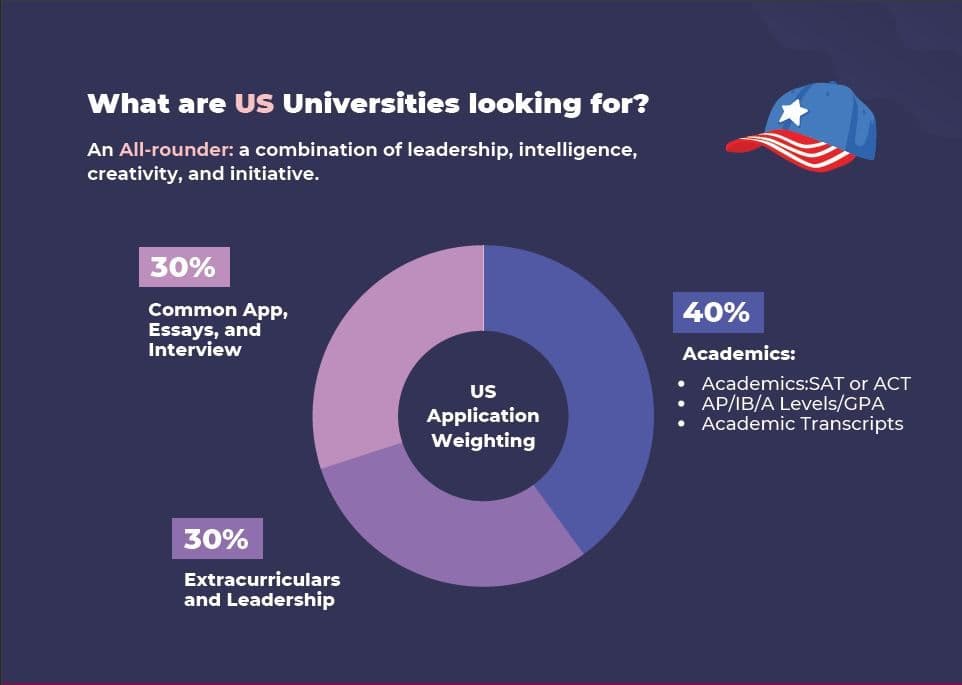Can You Get Into Top US Universities Without Straight A’s?

Summary
Grades are important in US university admissions but aren’t the only factor. Top schools use a holistic approach, considering your extracurriculars, essays, recommendations, and test scores alongside your grades.
Can you get into top US universities with average grades? In discussions around this topic, you might believe that the answer is a hard no. When it comes to applying to top US universities, many people might tell you that “average grades” automatically disqualify you. In this blog, we’ll take a closer look at this question, breaking it down to give you a more nuanced understanding of how admissions decisions are made and what other factors can strengthen your application.
Holistic Admissions Process
Many top US universities make use of a holistic approach to evaluate their candidates. What this means is that grades are just one of the many ways in which they view their potential students. In fact, your grades will be weighed alongside other factors like your participation in extracurricular activities, your personal essays, recommendations from your mentors, and your own background. All of this creates a rich tapestry representing who you are, and while your grades are certainly part of this, it’s unlikely that the decision-making process will focus heavily on any one factor — different aspects of your application will be weighted accordingly.
Below, we’ve included a helpful diagram to visualise the weightage of the application process for US universities. As shown, the holistic admissions process is divided into three main components: 40% for your grades, and the remaining 60% split evenly between extracurricular activities and your essays or interviews (each receiving 30%). Only when put all together do they make up 100%, meaning that all of these factors do play a role in determining whether you’re made an offer of admission!


Strengths Beyond Academics
Building on the idea of showcasing a holistic profile to your admissions officer, universities are ultimately evaluating you based on what you’d be like as a potential student. This might come in the form of imagining how you can contribute to their existing campus culture. So, it might be useful to keep that in mind as you work on creating a well-developed profile showcasing who you are outside of the classroom! This could come in the form of emphasising your unique talents, leadership roles, or your special skills in athletics or the performing arts. All of these are ways of spotlighting your personality and aptitudes, which are valuable clues for your admissions officer.
A helpful tip from Crimson’s CEO, Jamie Beaton, in a Wall Street Journal feature is to include about ten activities in your application. This allows you to showcase a coherent focus on one or two themes that will stand out to admissions officers. Ideally, at least one activity should have a social justice component, depending on your passions.
When including leadership positions, aim for breadth by categorising them as institutional or entrepreneurial:
- Institutional roles: These positions, such as sports captain or class president, demonstrate leadership within an established structure.
- Entrepreneurial roles: These require initiative and self-discipline, showcasing your ability to identify problems and create innovative solutions.
By thoughtfully categorising your experiences, you’ll present a well-rounded and impactful application.
Impact of Personal Essays
The personal essay is yet another crucial tool when it comes to painting a detailed portrait of yourself for your admissions officers. Some top universities in the US, for example, may supply you with some prompts via the Common App to get your creative juices flowing, but what you write in this element will be entirely up to you! As a result, the personal statement is a great opportunity to craft a cohesive and compelling narrative that’s central to your development as an individual, and let your own voice shine through.
Strong Recommendation Letters
Typically, universities will ask for letters of recommendation from teachers or mentors who have worked closely with you. This will help them get a better sense of your potential as well as your accomplishments, going beyond the finished product presented on paper. A few strong letters of recommendation could actually help with giving your candidacy a boost, especially if you feel your grades aren’t as strong as you’d like them to be. In lieu of them, then, a letter or recommendation that can testify to your strengths in elements like leadership or integrity could make a world of difference to your application!
Here, a helpful tip to remember when it comes to asking for a strong recommendation letter is that it’s not entirely out of your control. It might be helpful, for example, to provide your teachers with specific details or examples of your achievements and experiences that you’d like them to highlight in your recommendation letter. Teachers are often expected to write many recommendation letters for many students, so providing these details on your part may prove helpful to both them and you!
Besides that, you can also take note of the three rules of asking, which are:
- Ask a teacher or mentor who knows you well: Ideally, you want someone who has worked with you for at least a year and can speak to your strengths accurately!
- Ask in person: Though it’s definitely a little nerve-wracking to do so, asking in person is the best way to appeal genuinely to your teachers for their help.
- Ask early: As highlighted above, teachers often find themselves buried under requests for recommendations as the application period hits its stride. So, it’s best to get ahead of the curve, and ask early so you know you have all your ducks in a row come time to hit submit!
Maximising Standardised Test Scores
If you’ve taken the A-levels or the IB route, but feel that your grades aren’t up to scratch, another helpful way to boost your application is by including your scores for the SAT or ACT. In short, these are nationally-recognised standardised tests which provide a familiar metric for admissions officers to accurately assess your academic calibre. Furthermore, including them alongside your A-level or IB scores could actually help you stand out in a competitive pool of candidates, and make you appear more well-rounded given their different modes of assessment!
The good news: you can take the SAT more than once and use a strategy called ‘superscoring’, where some colleges allow you to combine your highest section scores from multiple test dates to create the optimal composite score.
Effectively, you’ll be able to harness your experience and score on the first test and take the summer break to improve in time for your second sitting! Here, there’s no getting around the fact that practice makes perfect. We’ve got SAT and ACT practice tests available, to help you quickly pinpoint your areas for improvement and hopefully build your confidence with every attempt!
Special Circumstances and Demonstrating Resilience
It’s no secret that the last few years have been particularly difficult for most people. You may find yourself having stepped out of your comfort zone, or emerged on the other side of what may have been some of your greatest challenges. These will, arguably, have been crucial in shaping who you are today, and can therefore be tapped upon as important context when it comes to demonstrating your value to admissions officers. You could elaborate upon any challenges you faced in high school in the ‘Additional Information’ section stipulated on the Common App, but do make sure to emphasise the resilience and growth you underwent.
Case Studies of Crimson Students
Don’t just take our word for it — here are some Crimson students who successfully gained admission to top universities without perfect grades!
Arya’s Road to Cornell University: While his grades weren’t necessarily where he wanted to be, Arya collaborated with his Crimson mentors to perform well at the SATs, and build a strong extracurricular portfolio!
From Polytechnic to Film School in the US: Having to juggle his commitments to National Service (NS) and work while applying for university in the US, Marcus worked closely with his mentor to write strong essays which highlighted his motivation and passion for his chosen path!
Balancing Your School List
While it’s good to set your sights high and be ambitious, it’s equally important to be realistic. Aiming solely for prestigious universities may seem like a good idea, but realistically, they constitute what we refer to as “reach” schools. These schools are notorious for their low acceptance rates, and incredibly competitive admissions processes. As a result, it’s not ideal to rely on these institutions to guarantee you admission. Instead, you might consider diversifying your admissions strategy by applying to a range of safety, target, and reach schools.
Here’s a quick glossary of those terms, to help you grasp what we mean:
Safety school: A university where you’re confident of admission, especially as they consistently admit students with lower test scores than yourself.
Target school: A university where your test scores fall into the average range of students consistently admitted, and you have a good chance of getting in.
Reach school: Also known as a ‘dream’ school, which typically accepts candidates whose academic performance is slightly above yours.
In applying to a mix of schools across these three categories, you’ll be able to manage your own expectations while also opening yourself up to a wider range of opportunities!
Conclusion
Throughout this blog, we’ve emphasised the holistic approach utilised by US universities when it comes to their admissions. Though this means that it isn’t grade-centric, it doesn’t mean that they don’t matter at all! Your grades are still an important component; they’re just weighed alongside other elements of your experience both inside and outside the classroom.
In practice, this means you should continue striving for academic excellence while continuing to embrace your unique strengths and experiences! This might sound hard to do, but the most important element here is not to give up, or feel defeated, even if your grades aren’t where you want them to be.
It’s never too late to get where you want to be. By harnessing the right study skills—such as time management or a specific note-taking method—setting realistic goals, and asking for help when you need it, your grades don’t have to feel like an insurmountable challenge. By focusing on the path forward, you can manage your expectations and eventually navigate the university admissions landscape with confidence!


